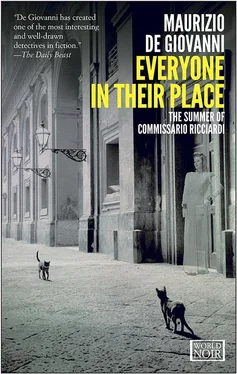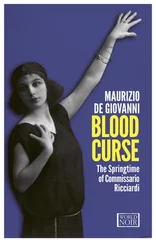Maurizio de Giovanni - Everyone in Their Place
Здесь есть возможность читать онлайн «Maurizio de Giovanni - Everyone in Their Place» весь текст электронной книги совершенно бесплатно (целиком полную версию без сокращений). В некоторых случаях можно слушать аудио, скачать через торрент в формате fb2 и присутствует краткое содержание. Жанр: Исторический детектив, Полицейский детектив, на английском языке. Описание произведения, (предисловие) а так же отзывы посетителей доступны на портале библиотеки ЛибКат.
- Название:Everyone in Their Place
- Автор:
- Жанр:
- Год:неизвестен
- ISBN:нет данных
- Рейтинг книги:4 / 5. Голосов: 1
-
Избранное:Добавить в избранное
- Отзывы:
-
Ваша оценка:
- 80
- 1
- 2
- 3
- 4
- 5
Everyone in Their Place: краткое содержание, описание и аннотация
Предлагаем к чтению аннотацию, описание, краткое содержание или предисловие (зависит от того, что написал сам автор книги «Everyone in Their Place»). Если вы не нашли необходимую информацию о книге — напишите в комментариях, мы постараемся отыскать её.
Everyone in Their Place — читать онлайн бесплатно полную книгу (весь текст) целиком
Ниже представлен текст книги, разбитый по страницам. Система сохранения места последней прочитанной страницы, позволяет с удобством читать онлайн бесплатно книгу «Everyone in Their Place», без необходимости каждый раз заново искать на чём Вы остановились. Поставьте закладку, и сможете в любой момент перейти на страницу, на которой закончили чтение.
Интервал:
Закладка:
The sun starts to filter through the kitchen window. The heat never subsided, all night long. You think of him. And you think that by now he’s heard the news.
With slumped shoulders, facing the wall by the kitchen sink and waiting for your children to wake up, you laugh. Softly, you laugh.
Ricciardi looked around at Monday morning, on his way into police headquarters. In the summer, the beginning of the week seemed to be more of a day of regret, as if Sunday were a missed opportunity; as if people still needed an extra dollop of rest or enjoyment.
The commissario sensed it when he saw the barefoot, half-naked street urchins, their skin roasted by the hot sun, pouring out of the vicoli and chasing after the first, early morning trolley cars to hang on for the ride, the dangerous ride down to the sea on the Via Caracciolo. He sensed it when he saw that the earliest opening shops were still shut, the same shops that he normally found open for business on his morning walk; instead, now he saw only a few sleepy stock boys still wrestling open the heavy wooden shutters and setting out the display merchandise under the cover of the thick canvas awnings.
He sensed it when he saw the windows still closed, pilfering a little more sleep and shade from the sun, which was already high in the sky and scorching hot.
Ricciardi had another especially well developed faculty: his sense of smell. That rainless summer was therefore particularly painful for him. The odor of rot that wafted out of the sewers and gusted through the vicoli was nauseating. Everything that rotted in the hot sun and wasn’t carted away made him gag as it permeated the street with its miasmas, befouling the air and making it impossible to breathe. Every day dozens of children and old people fell ill from poor hygiene, dying in their homes and at hospitals, to the utter indifference of the press and the radio. Ricciardi wondered how it could be that the newspapers conspired to whitewash that terrible situation, and instead chattered on in dulcet tones about the visits to the city of royal princes and transoceanic aviators. Everyone has their ghosts, he thought: it’s just a matter of knowing how to ignore them.
When he got to the office he found Ponte waiting outside the door, bouncing on the balls of his feet as if he urgently needed to go to the bathroom. Unlike the usual state of affairs, for once the deputy chief of police was already in his office, and wanted to see him immediately. With a sigh, Ricciardi followed the clerk who continued to look everywhere except at the commissario’s face.
Mario Capece was smoking on the balcony of the newspaper’s offices. He always stayed later than all the others, after the frantic night’s work that preceded the daily celebration as the paper’s first edition rolled off the presses. He usually liked to watch the newsboys with their stacks of fresh newsprint on their shoulders, eager to shout the first headlines to a city that was still asleep. But today’s headline was one he’d never have wanted to hear.
Mario Capece was crying. His colleagues watched him from behind, from inside the newsroom, unable to do anything to comfort him. When earlier that afternoon an exceedingly young copyboy had galloped into the newsroom, breathless and fearful to reveal his news, it was immediately obvious that something very serious had happened. From his office, Capece hadn’t seen the boy arrive, and so the copyboy was first able to inform his deputy editor, a close old friend, fellow veteran of a thousand battles.
The man had taken upon himself the terrible assignment of breaking the news to Capece. The other journalists had seen him shut the door behind him, they’d waited through the moment of silence that ensued with bated breath, and then they’d heard their boss’s despairing shout of extreme grief and sorrow.
The affair that Mario Capece, city editor of the Roma , was carrying on with Adriana Musso di Camparino was public knowledge; but what only a few close friends understood was the sheer power of the journalist’s emotions. Emotions that had sabotaged an otherwise brilliant career, a career that had screeched to a halt just short of the editorship of the city’s oldest newspaper; emotions that had exposed him to the ridicule and the pity of his adversaries, and that had isolated him, creating a vacuum around him. They had also chased away from him not only his wife but also his children, who were rigid and conservative as only the very young can sometimes be.
Capece had renounced everything for his love. In order to accommodate the whims of a beautiful and unstable woman, shallow and neurotic. A thousand times Arturo Dominici, Capece’s deputy editor and his best friend, had tried to reason with him. And a thousand times he had run headlong into the virulence and power of an emotion that was as deep-rooted and incurable as a tumor.
It had fallen to Dominici to break the news to Mario, at the end of a day during which his friend had been more on edge and irritable than usual. He’d expected Capece to rush to the dead woman’s side instantly, but instead he’d remained in his office until dawn.
On Saturday evening, Dominici hadn’t seen Capece in the newsroom, and he’d only come in much later that night, and dead drunk to boot. The deputy city editor had attributed his friend and editor’s pitable state to yet another fight: those fights were coming thick and fast these days. He’d helped him to stretch out on his office sofa and he’d reassured him. Once again he would take his place and supervise the production of that day’s edition. Before falling asleep, slurring his words, Capece had said to him:
“It’s over, it’s over, Arturo. This time it’s over for good.”
Dominici hadn’t believed him, of course. He’d heard the same phrase repeated a thousand times over the last three years. This time, however, his friend, gripping his arm, had pulled something out of his pocket and had showed it to him.
It was a ring.
Garzo was on his feet as he welcomed Ricciardi into his office, striding to the door to meet him. The commissario had learned to fear his superior officer’s cordiality far more than his imperious tone of voice or his professional lack of discernment: from the two latter qualities he could defend himself with competence and wry irony, but the only way to combat his cordiality was try to reestablish a sense of distance and formality.
This time, however, he perceived a psychological state that he’d never glimpsed before in the deputy chief of police. He looked as if he hadn’t slept all night: his tie was loosened, he had bags under his eyes, and his face was even covered with a shadow of whiskers.
It was a surprising thing: Angelo Garzo, a bureaucrat who had used image and personal relations as the engines of his career, never allowed himself to strike a pose or have an appearance that was anything less than formally impeccable. In those years, when every serious matter was referred to Rome, his remarkable diplomatic skills made him the most important man in the department. The chief of police turned constantly to Garzo for all contacts with the ministry and he, who didn’t really know how to do anything else, was happy to oblige. Among his underlings, one particular statement of his had become famous. It had to do with the discovery of a guilty party through a chain of reasoning he had been unable to follow: shaking his neatly groomed head, he’d said that if you want to understand evildoers, you need to be able to think like them, and he, who was an upright person, would never be able to understand a murderer.
That Monday morning, however, it was a very different person who greeted Ricciardi. He pointed his underling to one of the two chairs across from his uncluttered desk, brusquely waved Ponte out of the office, and sat down in his turn on the same side of the desk as the commissario.
Читать дальшеИнтервал:
Закладка:
Похожие книги на «Everyone in Their Place»
Представляем Вашему вниманию похожие книги на «Everyone in Their Place» списком для выбора. Мы отобрали схожую по названию и смыслу литературу в надежде предоставить читателям больше вариантов отыскать новые, интересные, ещё непрочитанные произведения.
Обсуждение, отзывы о книге «Everyone in Their Place» и просто собственные мнения читателей. Оставьте ваши комментарии, напишите, что Вы думаете о произведении, его смысле или главных героях. Укажите что конкретно понравилось, а что нет, и почему Вы так считаете.












